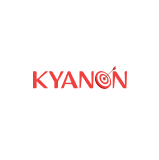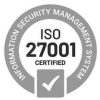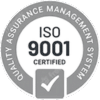The dedicated software development industry has experienced significant growth in recent years, driven by the increasing demand for custom software solutions across a wide range of industries. Dedicated software development refers to the practice of outsourcing software development to a specialized team of professionals who work exclusively on a particular project or set of projects.
In this article, Kyanon Digital will introduce 7 key roles every dedicated software development team should have for success.
1. 7 key roles of a dedicated software development team
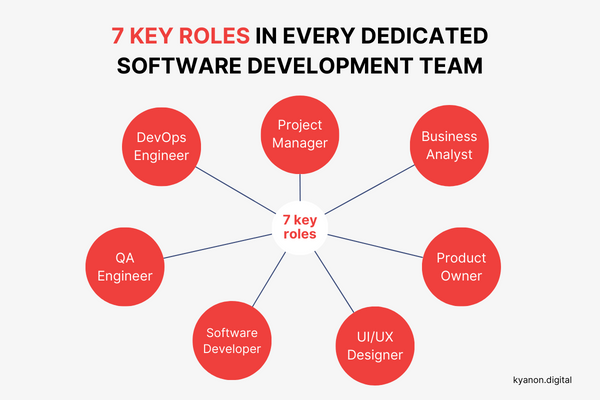
1.1. Project Manager – An Orchestra
The project manager is responsible for overseeing the entire software development project. They are responsible for creating and managing the project plan, defining requirements, and ensuring that the project is completed on time and within budget. They are also responsible for communicating with stakeholders and managing the team.
In addition, a project manager must be able to adapt to changing circumstances and respond to unexpected challenges, just as a conductor must adjust to changes in tempo or dynamics during a performance. They must be able to think on their feet and make quick decisions, while still keeping the project on track.
Overall, the role of a project manager is complex and multifaceted, requiring a wide range of skills and expertise. However, by effectively leading and coordinating the efforts of their team members, project managers can help ensure the successful delivery of projects, just as a conductor can help create a beautiful and memorable musical performance.
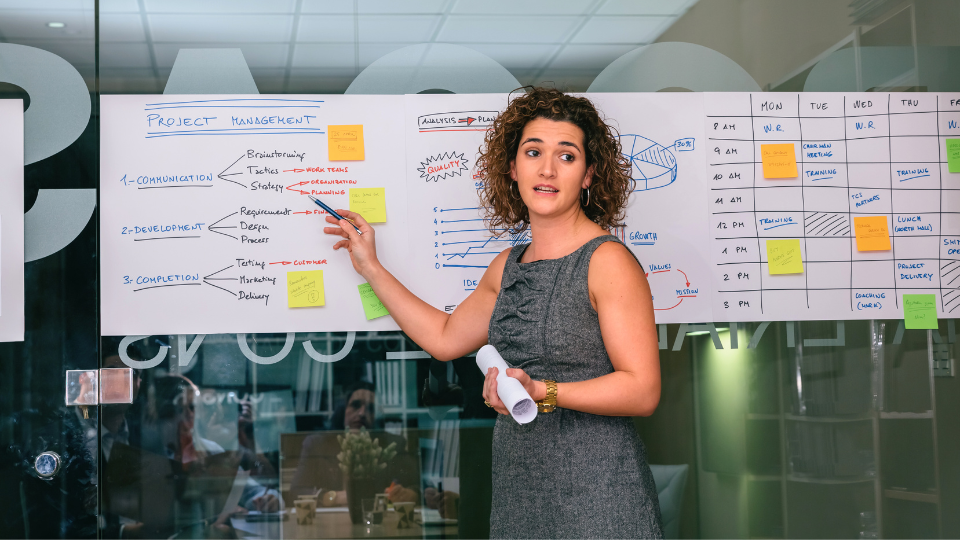
1.2. Business Analyst – A Detective
The business analyst is responsible for gathering and analyzing business requirements. They work closely with stakeholders to understand their needs and translate those needs into technical requirements that the development team can work with.
Like a detective, a business analyst must gather and analyze evidence to understand the root cause of a problem. They must be able to ask the right questions, identify patterns, and make connections between different pieces of information. They use these skills to create a clear picture of the problem and develop solutions that address the underlying issues.
In addition, a business analyst must be able to navigate complex organizational structures and communicate effectively with stakeholders, just as a detective must work with multiple parties to solve a case. They must be able to build relationships, gain the trust of others, and effectively convey their findings and recommendations.

1.3. Product Owner – A Captain of the ship
The Product Owner is responsible for defining the overall product vision and ensuring that the development team is aligned with that vision. They work closely with stakeholders to understand their needs and translate those needs into a clear and compelling product vision. Moreover, the Product Owner is responsible for managing the product backlog, which is a prioritized list of features and requirements for the product. They work with stakeholders to prioritize the backlog based on business value, technical feasibility, and user needs.
The Product Owner communicates regularly with stakeholders to provide updates on the project’s progress, gather feedback, and ensure that the product is meeting their needs. They must be able to effectively communicate technical information to non-technical stakeholders and manage expectations.

1.4. UI/UX Designer – The Mind-reader
The UX/UI designer conducts user research to understand the needs, behaviors, and preferences of the target audience. They use this information to create a design that meets the needs of the user and provides a positive user experience.
Besides, they are also responsible for designing the user interface of the software solution. They create wireframes, mockups, and prototypes that provide a visual representation of the product’s design.
The UX/UI designer creates a consistent design language that is applied throughout the software solution. This includes the use of color, typography, and visual elements to create a cohesive and visually appealing design.

1.5. Software Developer – A Chef
A software developer can be compared to a chef. Just as a chef uses a recipe to create a dish, a software developer uses code to create a software solution.
Like a chef, a software developer must have a deep understanding of the ingredients they are working with. They must be fluent in programming languages, frameworks, and tools, and understand how to use them to create a software solution that meets the requirements of the project.
Overall, the role of a software developer is critical in creating a software solution that meets the needs of the business and its stakeholders. By using their technical expertise, creativity, and collaboration skills, software developers can help create software solutions that are efficient, effective, and sustainable over the long term.

1.6. Quality Assurance (QA) Engineer – A Safety Inspector
The QA engineer is responsible for ensuring that the software solution meets the quality standards set by the project. They develop and execute test plans, report defects, and work with the development team to ensure that the defects are resolved.
A QA engineer must also collaborate closely with other members of the development team, such as software developers, UX/UI designers, and product owners. They must be able to communicate effectively, provide feedback, and work together to ensure that the software product meets the necessary quality standards.
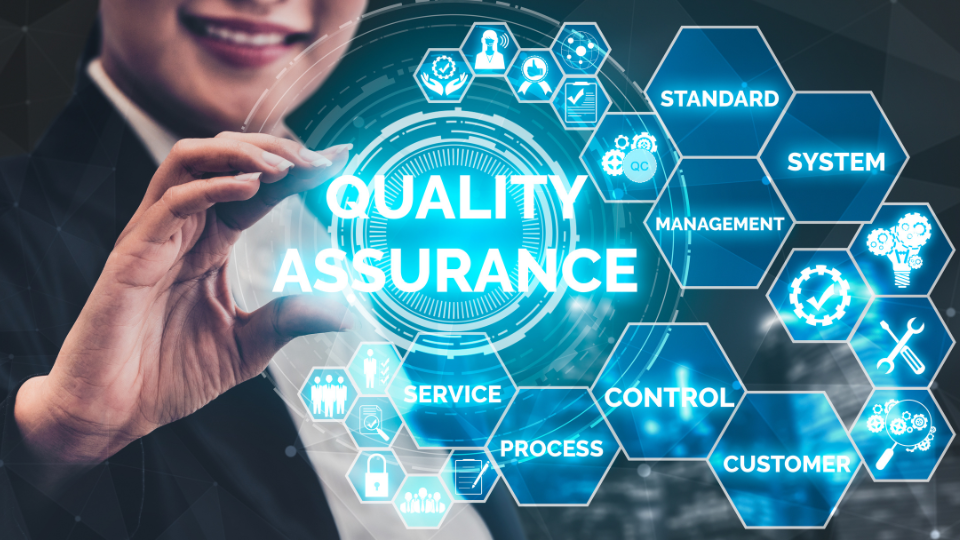
1.7. DevOps Engineer – A Controller
A DevOps Engineer in a dedicated software development team is responsible for bridging the gap between the development and operations teams. Despite the adoption of Agile methodologies, development and operations teams may still operate separately from one another. To mitigate this, DevOps engineers serve as intermediaries, connecting the two teams and optimizing the software delivery process through automation. They strive to find a balance between rapid implementation of changes and maintaining the stability of the application.
For a DevOps engineer to be effective, they must have a comprehensive understanding of both development and operations, which includes knowledge of coding, infrastructure management, system administration, and DevOps toolchains. Working together with software developers, system administrators, and operational personnel, DevOps engineers supervise and facilitate the release of code based on continuous integration and continuous delivery (CI/CD) principles.
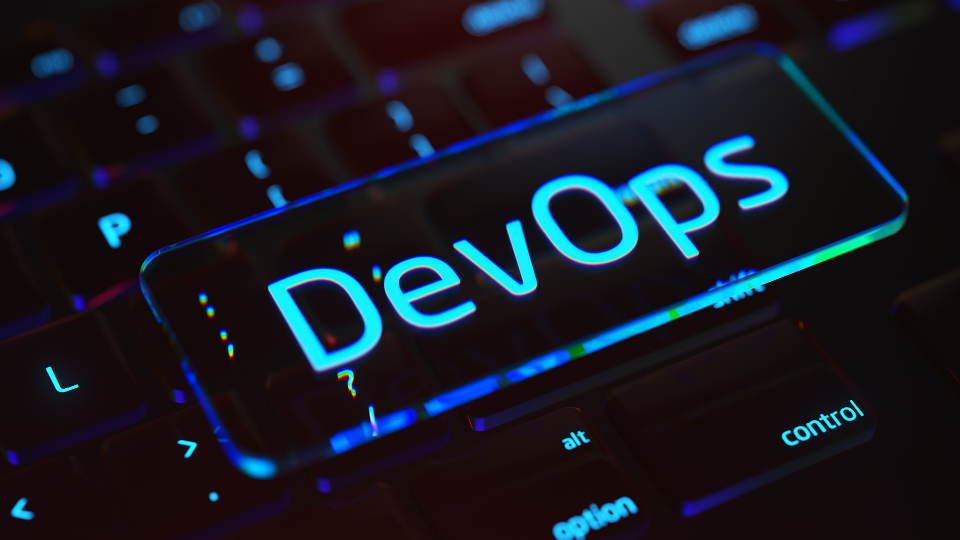
2. Dedicated Software Development Team at Kyanon Digital
The two-pizza methodology is Agile practice at its best. Our small teams value individual interactions, embrace change, and think outside the box for continuous improvement to be achieved. We use the best practices from Scrum and XP to develop unique solutions that lead to your success, all that with the utmost focus and transparency.
Kyanon Digital can help you build an Agile product oriented team which enhances productivity and motivates people to innovate through effective interactions.
Contact us and have consultation with our experts to choose the best dedicated development team for your software development outsourcing.
Get the Vietnam Software Outsourcing Pricing Guide 2025
Your shortcut to Vietnam’s outsourcing costs and key market insights.

Why work with Kyanon Digital?
- Expertise Trusted by Fortune 500 Clients
With deep experience serving Fortune 500 companies, we deliver tailored, high-impact solutions that meet the unique demands of global enterprises. - A World-Class IT Team
Our 500+ IT experts—spanning consulting, project management, technical architecture, software engineering, QA, DevOps, and AI/ML—are committed to excellence in every project. - Quality at the Core
Certified under ISO 9001, our quality-first approach guarantees precision, reliability, and continuous improvement. - Uncompromising Security
ISO 27001-certified, we integrate robust security into every process, leveraging advanced technologies to protect your data against evolving threats.







